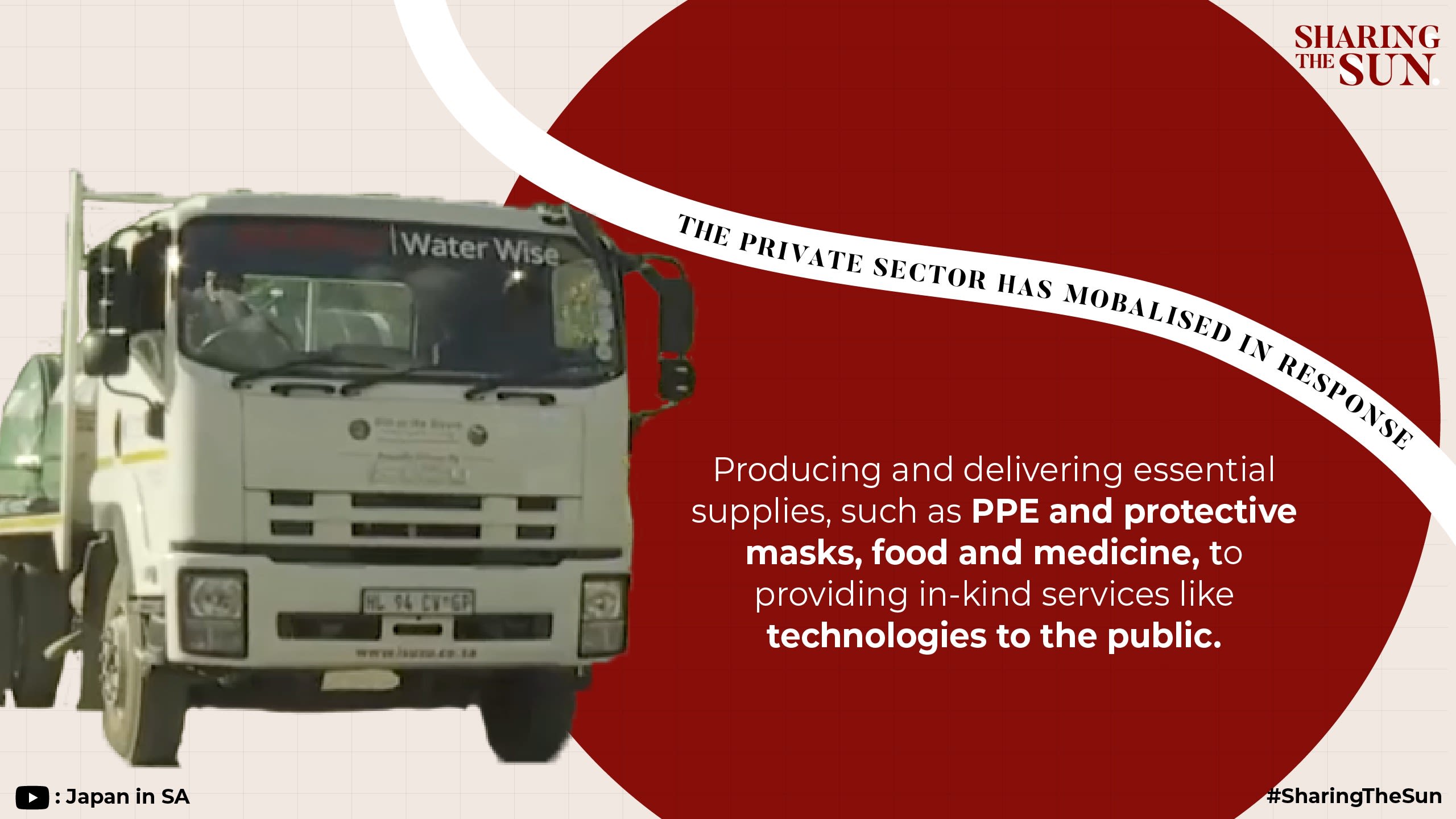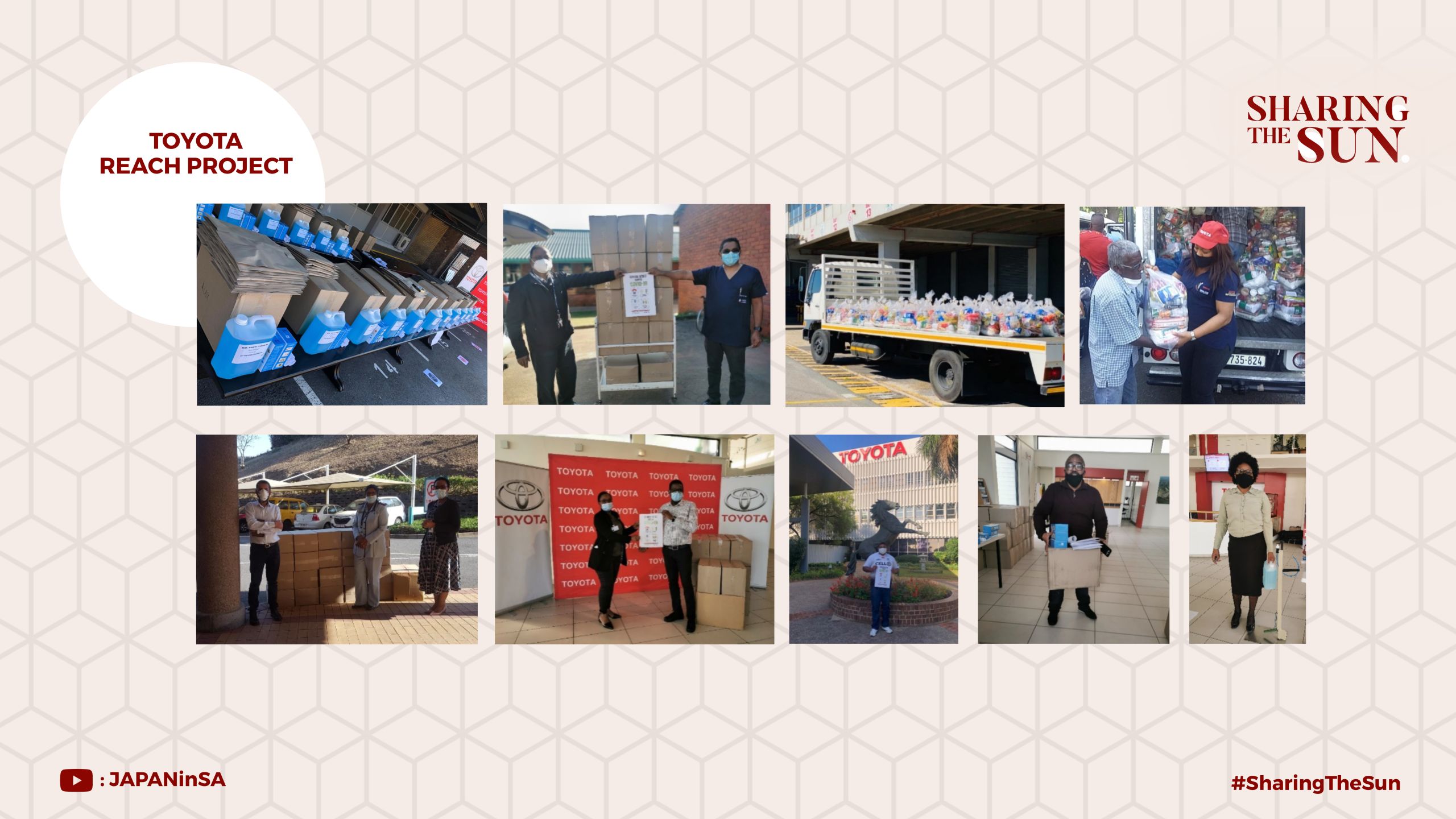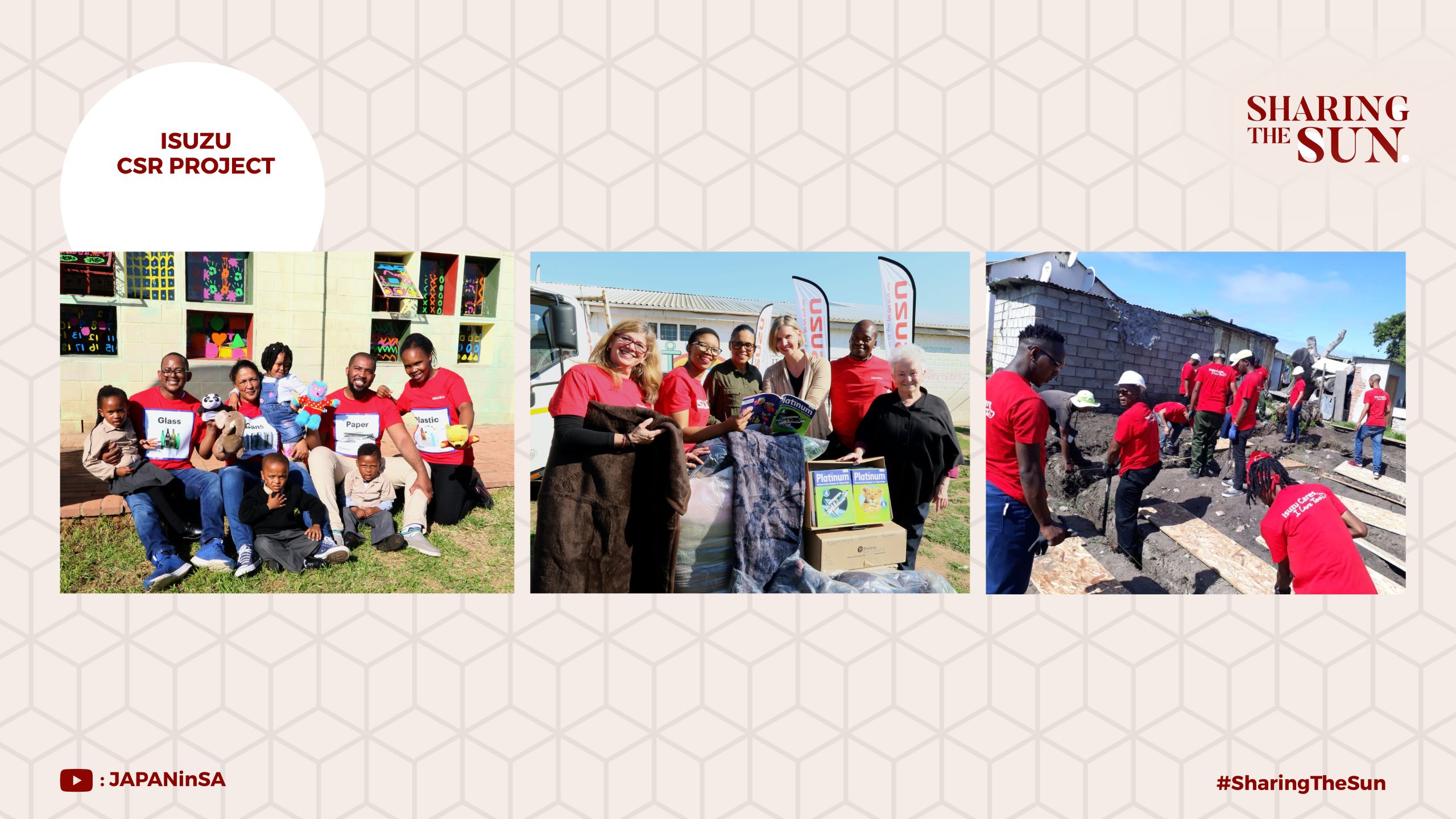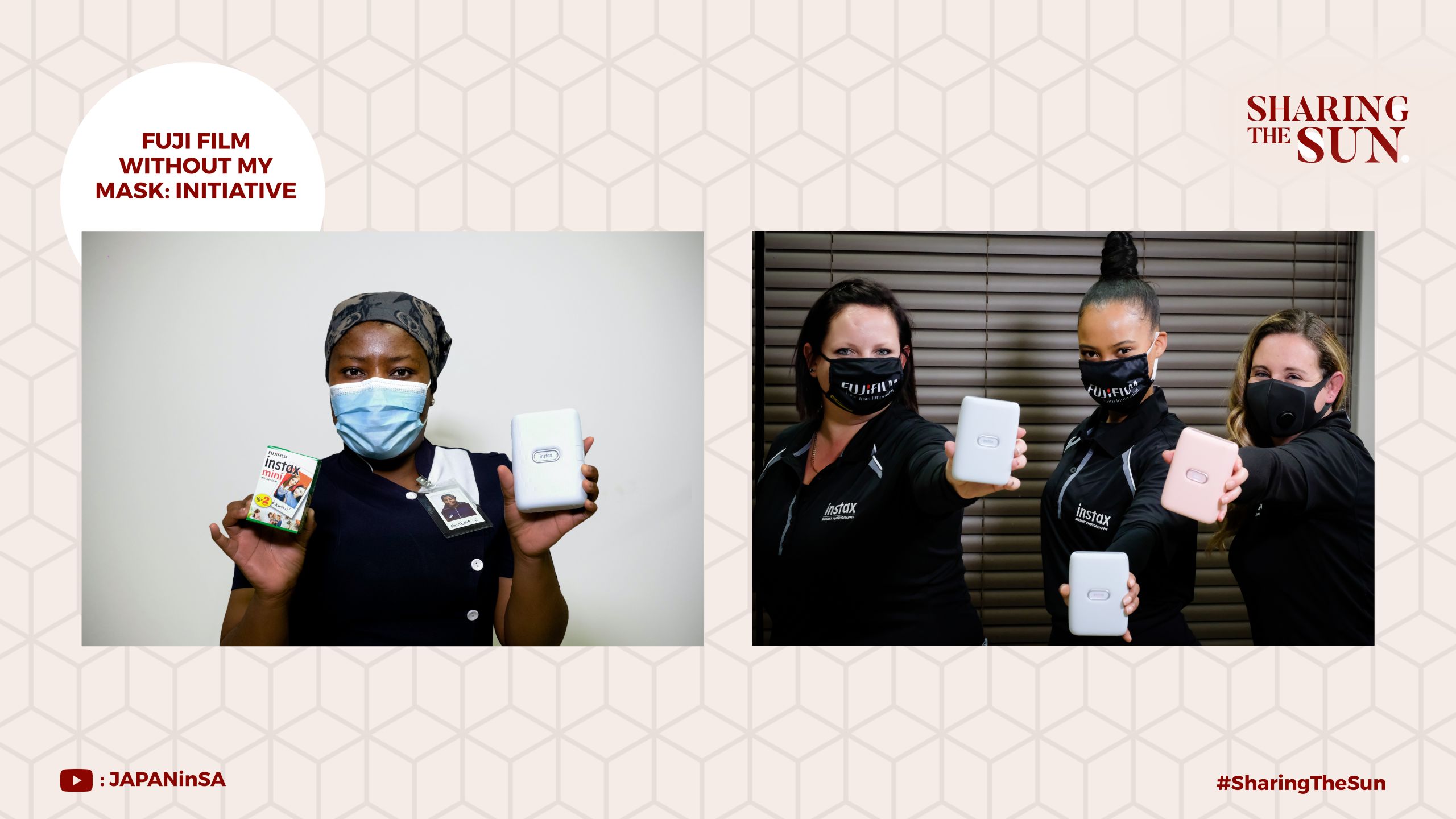
Covid-19 has been a defining moment for the entire world, reshaping the way we live, work and play.
Governments all over the world have battled to contain the spread of the virus, and healthcare systems in even the most developed countries have been overwhelmed.
In South Africa, Japanese companies with operations in the country – including Toyota, Isuzu, Fujifilm, and NEC XON have developed comprehensive support programmes to help both government and NPOs respond to the pandemic in many practical ways.
Toyota, which first established operations in South Africa in 1961, was quick to respond. During the first wave, the company focused its efforts on critical interventions, including the supply of personal protective equipment (PPE) to public hospitals and the supply of food parcels to communities most hard-hit by the lockdown. During April and May 2020, it engineered and funded the manufacture of 7 000 face shields, distributing these and a further 5 900 face shields and 36 000 face masks funded by other donors to 13 government hospitals in KwaZulu-Natal.

During the same period, it funded and distributed food parcels to 1 500 families in KwaZulu-Natal and 500 families in Tembisa and Alexandra in Gauteng.
Once regulations were eased, it launched a dedicated schools readiness programme, providing assistance to 206 schools in townships, informal settlements and the Ngonyameni rural area in KwaZulu-Natal, as well as to 70 schools in Alexandra and Tembisa. Each school received face shields for all educators, two IR thermometers, Covid-19 posters, and a foot-operated sanitisation stand with 5 litres of hand sanitiser.
The company, which is a key supplier of vehicles to the minibus taxi industry, also funded the full sanitisation of 85 scholar transport vehicles and distributed sanitiser and educational material to the drivers. In addition, it donated 65 000 litres of sanitising liquid, face masks and educational material to the taxi industry as a whole.
During the second wave, Toyota and a number of its business partners pledged R15 million to assist public health departments in the eThekwini Metro and throughout KwaZulu-Natal. The funding was used to provide testing equipment and facility support in public hospitals as well as 50 000 face shields for frontline workers. Toyota also donated 10 4x4 double-cab vehicles for dedicated contact tracing.
In addition, Toyota and it’s business partners sponsored a mobile testing lab and refurbished and upgraded the pharmacy at the Clairwood Hospital in Mobeni and provided Toyota Production Systems expertise to design and improve process flows there. As the hospital will remain an infectious diseases centre in the future, the new infrastructure is an invaluable addition to its facilities.
Isuzu, a leading producer of commercial vehicles and diesel engines, has been equally active. In a first-wave initiative involving the University of Pretoria, Wesbank and FirstRand, the company deployed a fleet of 15 Isuzu D-MAX bakkies to transport personal protective equipment (PPE) and medical supplies to community healthcare centres. It later made its press test fleet available to the humanitarian relief organisation, Gift of the Givers, to support its own Covid-19 intervention initiatives.
These vehicles were used to distribute essential food supplies to stressed communities and to transport water into drought-stricken areas. Refrigerated trucks were also provided to transport frozen and chilled fish.

Isuzu also rallied to support the Nelson Mandela Bay Business Chamber’s Ubuntu Covid-19 initiative. The company undertook to renovate several wards at the Livingstone and Provincial Hospitals in Gqeberha in order to increase the healthcare system’s ability. In a project spearheaded by Isuzu’s own maintenance department, a number of wards at Livingstone were provided with an isolation unit for staff use and total capacity was increased by 135 beds. A building at the Provincial Hospital was also refurbished to accommodate 25 beds so that it could serve as a transfer location for Covid-19 patients.
In addition, the company erected marquee tents at Livingstone and the Dora Nginza Hospital in the city as well as at the Laetitia Bam Clinic in Kwanobuhle, which were used as temporary testing facilities. The tents were fully fitted with lighting and electricity and were equipped with tables and chairs.
Even during the early weeks of the pandemic, it became clear to Fujifilm, the world’s largest photographic and imaging company which is also known for its innovation in health care, that Covid-19 patients were experiencing high levels of stress because they could not see the faces of the healthcare professionals caring for them. In an attempt to mitigate this stress, the company launched an innovative programme called Without My Mask.

Equipped with cameras and portable printers, Fujifilm representatives visited hospitals to take photos of doctors, nurses and support staff, instantly producing badges they could wear to make them identifiable to their patients. This introduced a much-needed personal touch into an extremely difficult situation.
The first facility to benefit from the initiative was Medicross The Berg in Bergbron, Johannesburg. On Mandela Day in July 2020, a Fujifilm team visited the facility to launch the programme as a means of giving 67 minutes back to the community. Staff at the hospital reported a notable difference in the way patients responded to them once they could see their faces on their new identification badges, which lifted the spirits of patients and staff alike. The Without My Mask programme has since been rolled out to a number of other hospitals throughout South Africa.
In the area of diagnosis, Fujifilm portable X-rays and ultrasound machines were used to provide essential flexibility in overcrowded hospital emergency rooms.
Technology and communications company, NEC XON, deployed its NeoFace Watch facial recognition platform and specialised thermography cameras at its premises to monitor the movement of staff, suppliers and visitors to reduce the risk of infection to all. The cameras include optical lenses that visually identify anyone entering the premises and measure skin temperature. This AI-powered technology, which is commercially available, is a robust and reliable way for retail centres, educational institutions, office complexes and government buildings to protect the wellbeing of both employees and visitors.
Reflecting the close relationship between Japan and South Africa, Japanese companies continue to support both government institutions and NPOs in their ongoing response to Covid-19.
To find out more about these initiatives and similar programmes funded by Japan and Japanese companies in South Africa, tune into The Embassy of Japan in South Africa’s web series ‘Sharing the Sun’ which airs every Thursday on the YouTube Channel (JAPANinSA).
Find the Embassy of Japan on Instagram, Facebook and Twitter.



